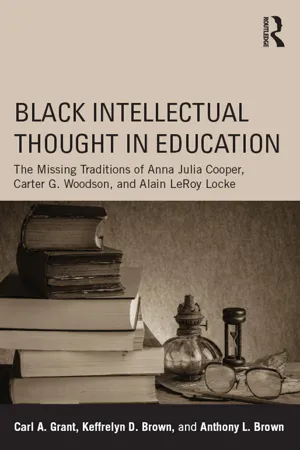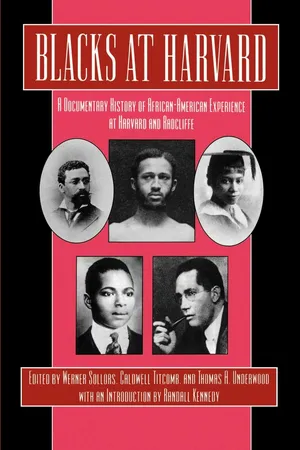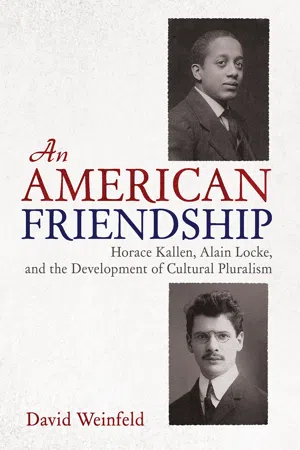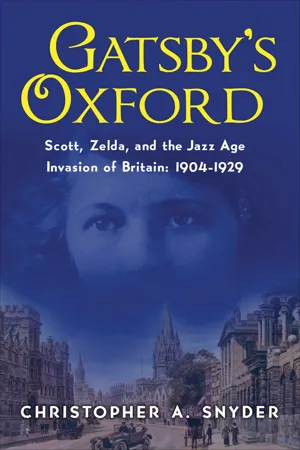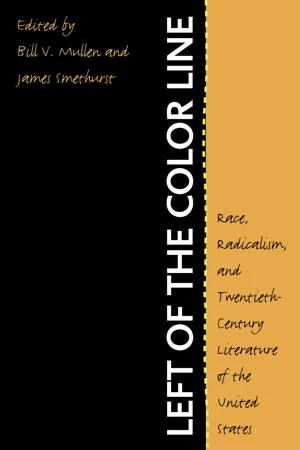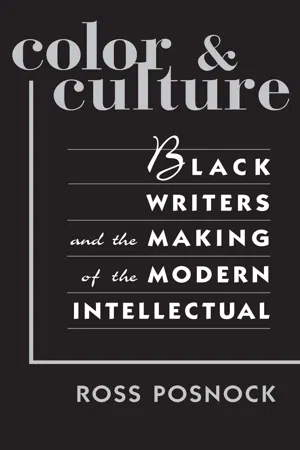History
Alain Leroy Locke
Alain Leroy Locke was a prominent African American philosopher, writer, and educator known as the "Father of the Harlem Renaissance." He played a crucial role in promoting and celebrating African American culture and art, advocating for racial equality and the recognition of African American contributions to society. Locke's influential work helped shape the cultural and intellectual landscape of the 20th century.
Written by Perlego with AI-assistance
Related key terms
1 of 5
6 Key excerpts on "Alain Leroy Locke"
- eBook - ePub
Black Intellectual Thought in Education
The Missing Traditions of Anna Julia Cooper, Carter G. Woodson, and Alain LeRoy Locke
- Carl A. Grant, Keffrelyn D. Brown, Anthony L. Brown(Authors)
- 2015(Publication Date)
- Routledge(Publisher)
4 TO CAPTURE THE ELUSIVEAlain Locke on Diversity, Cultural Knowledge, and Race“Too few well understood or adequately appreciated Locke”—Ralph Bunche on Alain Locke on the occasion of his memorial. (Carter & Harris, 2010) Introduction“Locke’s intellectual sojourn as a philosopher is in less need of explanation than appreciation” (Harris, 1989b, p. 10). We choose these words to open this chapter on Alain L. Locke, an extraordinary intellectual who equally claimed the role of scholar, philosopher, and aesthete.In many ways Locke was an anomalous figure for his time. He was highly educated and unusually accomplished, a point made even more poignant as a Black man in early twentieth century US. He was also a gay man, a fact that he did not hide but that was less openly acknowledged in the context of early work produced about him. In fact, some scholars have suggested that Locke’s sexuality may have played a role in the limited attention he was given as a contributor to American education thought and in his overall positioning as apolitical (Porter, 2012). Locke was most often associated with the Harlem Renaissance and the role he played in supporting and grooming the Black arts movement of the early twentieth century. For many years, this aspect of Locke’s scholarship threatened to eclipse his other scholarly areas of interest, including cultural pluralism, race, and adult education. Locke wrote extensively about the Black arts, spanning across the genres of writing, visual, music, and performance.For all of his contributions the scholarly community as a whole has paid limited attention to his work. A corpus of scholarship devoted to Alain Locke has emerged since the 1990s with much of this focused on Locke’s philosophical ideas related to values, culture, art, and race. Edited books (e.g., Carter & Harris, 2010; Harris, 1999; Molesworth, 2012a), bound collections of Locke’s lectures, essays, and reviews (Harris, 1989; Stewart, 1992), several biographies (Buck, 2005a; Cain, 2003; Harris & Molesworth, 2008), and an expansive number of journal articles and dissertations comprise this burgeoning body of work. Most of this work was produced in academic fields outside of the field of education. Aside from a few articles and dissertations written in the area of adult education, and one dissertation focused partially on Locke’s intellectual ideas related to Blackness and critical theory (Porter, 2012), virtually no scholarship exists on Locke and education, specifically critical educational thought. - eBook - ePub
Blacks at Harvard
A Documentary History of African-American Experience At Harvard and Radcliffe
- Werner Sollors, Caldwell Titcomb, Thomas A. Underwood, Randall Kennedy, Randall Kennedy, Werner Sollors, Caldwell Titcomb, Thomas A. Underwood, Randall Kennedy(Authors)
- 1993(Publication Date)
- NYU Press(Publisher)
AI AIN LOCKEAlain Leroy Locke was born to schoolteacher parents on 13 September 1886 in Philadelphia, where he attended Central High School and the Philadelphia School of Pedagogy. A member of the Harvard class of 1908, he completed his requirements in three years, and received his A.B. magna cum laude in 1907, also winning the top Bowdoin Prize for an essay on Tennyson as well as election to Phi Beta Kappa. He became the first and, until 1963, only black American to win a Rhodes scholarship to Oxford, from which he took a Litt.B. degree in 1912.In 1918 he became-after W.E.B. Du Bois and historian Carter G. Woodson—the third black recipient of a Harvard Ph.D. degree, with a dissertation in philosophy on the theory of value. He had in 1912, after a year’s study at the University of Berlin, already begun teaching English, education, and then philosophy at Howard University, where he was also instrumental in establishing a drama program, art gallery, and literary magazine. Best known for his writing on literature, he was the godfather of the so-called Harlem Renaissance of the 1920s. He also wrote extensively on the fine arts (including those of Africa) and on music (he was a trained classical pianist). At the time Du Bois termed him “by long odds the best trained man among the younger American Negroes.”In mid-career Locke acknowledged his debt to Harvard, where “I was exposed to the Golden Age of liberalism and deeply influenced by Barrett Wendell, Copeland, Briggs and Baker, shed the Tory restraints for urbanity and humanism, and under the spell of Royce, James, Palmer, and Santayana, gave up Puritan provincialism for critical-mindedness and cosmopolitanism.” Locke spoke of his “not regretted vocation—a decent livelihood teaching philosophy; and … an avocation of mid-wifery to younger Negro poets, writers and artists. … I am sure it has all been due to Harvard, at least what there has been creditable and productive.” - eBook - ePub
An American Friendship
Horace Kallen, Alain Locke, and the Development of Cultural Pluralism
- David Weinfeld(Author)
- 2022(Publication Date)
- Cornell University Press(Publisher)
The biggest difference after Locke’s death came in Kallen’s growing appreciation of the cultural achievements and potential of African Americans. In the mid-1950s and beyond, Kallen encouraged exactly what Locke had striven for his whole life, the creation of a Black high culture with roots in folklore, a culture worth preserving in a pluralist United States. He actively participated in this project in his efforts to memorialize Locke.In December 1955 Kallen wrote to Arthur Huff Fauset, Locke’s friend and chair of the Alain Locke Memorial Committee. He praised the committee’s choice of celebrated Black writer William Stanley Braithwaite to author Locke’s biography. Kallen lauded Locke’s accomplishments: “What Booker Washington had been to the Negro and the American idea in the field of material skills and material achievement, Alain Locke was in the field of the spirit.” Locke “spoke to generations of young Negroes embittered by the exclusion from equal opportunity in the arts and sciences because of their color, and coming to resent not only the un-American prejudice which maintained the exclusion, but also the color which called forth the prejudice.”17Kallen saw Black artists and intellectuals “filled with self-hatred even more than with hatred of the prejudice.” Locke’s message was “to replace self-hatred with self-respect, to accept the Negro genius as Negro and to devote their talents and powers to recovering its historic and cultural past and to renew and develop it as Negro Americans into a figure of integral strength and beauty.” Locke’s vision of the New Negro “gave a new turn, a spiritually healthier and more hopeful turn, to the aspirations and labors of the younger generations of new talent.” He contributed “a chapter of spiritual importance in the history of American culture.”18The next year, Kallen published a volume based on lectures he delivered at the University of Pennsylvania in 1954. Cultural Pluralism and the American Idea: An Essay in Social Philosophy consisted of a lengthy essay where Kallen updated cultural pluralism, followed by responses to Kallen’s essay and finally Kallen’s “reprise” to his critics. Kallen referred several times to Locke. He observed that during the “Americanization” of the South that occurred in the near century after the Civil War, Black culture began to seep into the broader American culture.19 - eBook - ePub
Gatsby's Oxford
Scott, Zelda, and the Jazz Age Invasion of Britain: 1904-1929
- Christopher A Snyder(Author)
- 2019(Publication Date)
- Pegasus Books(Publisher)
66While achieving notoriety as both a literary critic and as a philosopher, Locke was an original thinker who drew from the American Pragmatists and presaged some of the ideas of Deconstruction and Derrida, especially cultural relativism. Locke grew into his role as a modernist and as patron and promoter of others. He had come a long way from the surface affectations of the Harvard dandy and Oxford Aesthete, a black Gatsby in search of his grail.At first glance, it would appear that Alain Locke and F. Scott Fitzgerald had little in common. Paul S. Brown argues, however, that in having his alter-ego Amory in This Side of Paradise denounce American materialism and hypocrisy, and in his mocking of Tom Buchanan’s racism in Gatsby, “Fitzgerald takes his place as part of an emergent and nontraditional intellectual class—including George Santayana and Alain Locke, Alice Paul and Margaret Mead, to name a few—that pushed for progressive ideas in a more open and pluralistic postwar nation.”67 Fitzgerald and Locke walked down the same streets and upon the same beaches of the Old World—at almost the exact same times—as they created their visions of a New America in the Jazz Age in 1924. Both writers indulged in aesthetic reveries of Oxonian and Gothic inspiration, if ultimately returning to America as motherland of very modern beauties.Alain Locke died on June 9, 1954, in New York City. It would not be until 1963 that America elected its next black Rhodes scholar, and few black students applied in the more than fifty years since Locke left Oxford.68 There were two famous men named Locke—both important philosophers and social critics—who attended the University of Oxford. The first defined equality and individual rights in the Enlightenment, the second struggled to define and defend a culture denied full equality and individual rights in the twentieth century. Being a Rhodes scholar did not make that struggle any easier. I have found no greater description of the ideal Rhodes scholar, however, than the one penned by Alain Locke in 1909: “If he has served his time and purpose well, he will be, I take it, a man whose sympathies are wider than his prejudices, whose knowledge is larger than his beliefs, his work and his hopes greater than he himself.”69 - eBook - ePub
Left of the Color Line
Race, Radicalism, and Twentieth-Century Literature of the United States
- Bill V. Mullen, James Smethurst, Bill V. Mullen, James Smethurst(Authors)
- 2012(Publication Date)
- The University of North Carolina Press(Publisher)
The Specter of Radicalism in Alain Locke's The New Negro Anthony Dawahare But fundamentally for the present the Negro is radical on race matters, conservative on others, in other words, a “forced radical,” a social protestant rather than a genuine radical. —Alain Locke, The New Negro In 1925 Alain Locke published what he hoped would be the founding anthology for the African American literary and cultural movement later called the “Harlem Renaissance.” The New Negro: An Interpretation instantly established a literary canon bound by values and interests that, to this day, direct popular views toward African American literature and life. Locke firmly believed that the literary works composing The New Negro embodied “a renewed race-spirit that consciously and proudly sets itself apart” (xxvii). Unashamed of their race and culture, his black contributors stood as ideal representatives of the “New Negro,” a post-war generation of black Americans whose cultural contributions, Locke claimed, would strengthen democracy in America. Recent anthologies of Harlem Renaissance literature continue to portray the movement as one devoted to racial expression, black pride, and American social reform. In this regard, The New Negro has been a tremendous success; its impact can still be felt. But the popularity of Locke's conception of the New Negro is largely the effect of ignoring the many other voices intensely engaged in debates over black identity, culture, and politics during the 1920s. More precisely, The New Negro should be contextualized in terms of the important postwar ideological fight between advocates of black nationalism, socialism, and American capitalism who in different ways struggled to position themselves as leaders of working-class black Americans. Through their respective cultural fronts, each faction sought to define the politics of the New Negro - eBook - PDF
Color and Culture
Black Writers and the Making of the Modern Intellectual
- Ross Posnock, Ross POSNOCK(Authors)
- 2009(Publication Date)
- Harvard University Press(Publisher)
Locke intended to enlarge black Americans' traditional and narrow options of either assimilation or nationalism. But a number of factors combined to hamper his liberatory project: historical circumstances bluntly discouraged any loosening of racial classification, and Locke's position as "New Negro" publicist required, he later acknowledged, that he turn race into a "commodity" (Philosophy 232). This unavoid- able chauvinism also reflected unresolved contradictions in his own thinking about the status of race. Later admirers of Locke's ideals also swam against prevailing cur- rents. Ralph Ellison and Albert Murray pondered a pragmatist pluralism that, borrowing Murray's words, thrives on "complexity and confu- sion" and is allergic to whatever "has any presumptions of purity. "2 Such impurity was anathema to sixties black political and cultural na- tionalists and to many multiculturalists in the eighties and nineties. In- tervening in the early debates in the 1970s about what, in the next decade, would be called multiculturalism, Ralph Ellison celebrated American culture as an "appropriation game" (Territory 28). This ex- pressed a Lockean stance that had to wait until the nineties to acquire 186 • Color and Culture new currency in our post-identity moment. Two decades before an audience was prepared to grasp it, Ellison renewed Locke's cosmopol- itan critique of "vested ownership" in culture. Ellison's "The Little Man at Chehaw Station," like Pauline Hopkins's Of One Blood) is an ingenious intellectual history that weaves together various strands. To this crucial late-seventies essay we now turn. Lambasted by the Black Arts movement of the sixties as apolitical, can- onized for decades by white liberals and neoconservatives as an icon of blandly affirmative Emersonian individualism, Ralph Ellison has suf- fered both caricatures. Now he is being rehabilitated by postmodern- ism: Isaac Julien, the black British avant-garde filmmaker, has invited him in from the cold.
Index pages curate the most relevant extracts from our library of academic textbooks. They’ve been created using an in-house natural language model (NLM), each adding context and meaning to key research topics.
